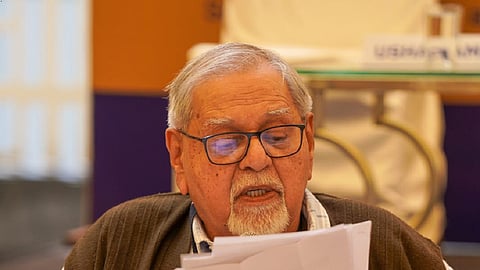

His mere presence and the tone of his simple dialogues have always made the Telugu audience roll over laughing. Shankar Melkote is one of those rare gems — cherished for both his theatre and on-screen performances. His unforgettable ‘Nen Nammanu’ dialogue still resonates with fans. At an event in the city, he exclusively spoke to CE about his journey, standup comedy, storytelling, and more.
Excerpts
We know you as an actor, comedian, theatre artiste, and managing director. How did you get into movies?
I’ve worked in theatre since my college days at Nizam College. My basic degree was in physics. After that, I studied law at Osmania University Law College. Later, I pursued a management degree from a university in the US. Even after graduating, my interest in theatre continued. From theatre, I moved to television, serials, telefilms, voiceovers, and cricket commentary.
From telefilms, it was a logical step to do feature films. I started fairly late, around 30 years old, and worked only for Usha Kiran Movies for the next 20 years until they stopped producing films. Then, I began working with other banners. I’ve done 180 feature films, primarily in Telugu, a few in Kannada (my mother tongue), and some in Hindi. Acting has always been a hobby for me, while my main career has been in the corporate world.
Since your first film, Srivariki Premalekha, you have collaborated with so many artistes. Can you share one moment that had a significant impact on your career?
I remember being called to Madras for a screen test with director Jandhyala Subrahmanya Sastry, known as the king of comedy. However, Jandhyala took one look at me and said, “Does this man need a screen test?” I was pleasantly surprised and deeply honoured by his confidence in me.
The shooting was done in Visakhapatnam with Jandhyala and it was an unforgettable experience. The film was incredibly well-made, filled with humour, and audiences loved it. It also marked the start of my journey in Telugu films.
Several years ago, we were sitting among the rocks in Gundlapochampally. We were having dinner by the lantern light — back then, it was a small village.
Shyam Benegal, my dear friend and mentor, was sitting there, looking at me intently. Suddenly, he called for Shama Zaidi, the costume designer, and said, “Shama, Shankar is playing the lawyer tomorrow. See that he gets ready.”
The whole village bargained with Shyam — it was getting dark, and he wanted my sideburns shortened for a particular look. Once that was sorted, he asked me, “You’ve been a lawyer before, haven’t you?” I said, “Yes.”
“Do you have the clothes?” he asked. “Yes, all of them except the gown. I gave that away,” I replied.
“No gown required,” he said, quickly adding, “We’re shooting in your chambers.”
I had the privilege of working alongside Girish Karnad. I thought to myself, “Wow, this is too much luck!” I was on cloud nine. (laughs) That was my first feature film, a Hindi one called Nishant — quite the unforgettable beginning!
What are your thoughts on the rise of stand-up comedy as a genre?
I haven’t seen much stand-up comedy, but I understand its appeal to the current generation. Established film artists have also embraced this genre, and it seems to provide an outlet for today’s stressful lifestyles. However, comedy should be tasteful and avoid offending sentiments.
How important do you think theatre training is for actors today?
Oh, theatre is the backbone, no doubt about it! It grounds you — it’s where the craft begins. But now, with social media and reels, people are skipping that step. Youngsters are jumping straight into movies without any training. And look, that’s okay in its own way, but they need to have some grounding. Theatre gives you that.
What are your thoughts on storytelling in films and plays today?
You know, storytelling in India has so much potential. We’ve got epics like the Mahabharata and Ramayana — timeless tales that are still so relevant. But instead of exploring them, we’re doing patchwork — cutting-edge nonsense. We’ve got a treasure trove of stories in our history and culture. We just need to tap into it.
What are three key learnings that would help youngsters stay on the right track in life?
My simple formula for a good life?
Truth and satisfaction
Be satisfied with what you have. I’m not saying you shouldn’t be ambitious — you absolutely should. But don’t keep craving for more, more, more. You’ll be permanently unhappy if you do that. Find that balance.
Consideration for others and the planet
Be considerate to fellow human beings, animals, and nature. This planet gives us so much. We have to care for it. If we don’t, there might come a time when the planet becomes unlivable. That’s not science fiction — it’s a possibility. So, be kind to your environment and to everyone around you.
Love and peace
Love is the antidote to so many problems. If there’s love, peace will follow. Be tolerant. People think differently, and that’s okay. Listen to them. Don’t cut them short. They have a point of view, and so do you. Everyone is equal. This idea of caste, colour, and creed — those are all man-made divisions. We need to rise above them and truly respect one another.